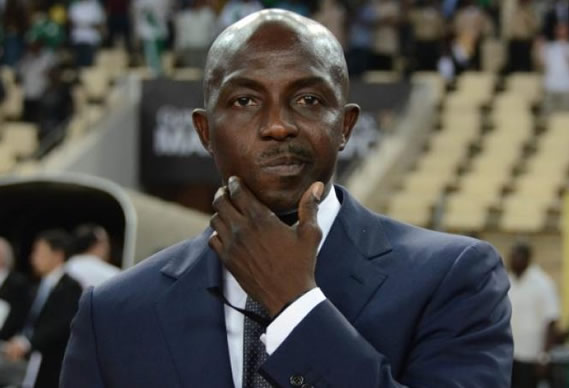Former Nigerian footballer and coach, Samson Siasia, has opened up about his experience as the head coach of the Super Eagles, taking over after the abrupt departure of Sunday Oliseh in 2016.
In a podcast with ex-international Emmanuel Babayaro and journalist Matthew Edafe on Saturday, Siasia shed light on the circumstances surrounding his appointment and the challenges he faced during his brief tenure.
“Oliseh ran away. He’s been a runner since… Like Don Johnson, what do you call him? Yes, here I was coaching the Olympic team. Oliseh said he no do again, saying he don move. Why? We don’t know,” Siasia recounted, referring to Oliseh’s sudden resignation as the Super Eagles coach.
Siasia further revealed that he was initially reluctant to take over the national team, stating, “They said, coach, you go take over. I said take over what? they said Super Eagles, I said no I don’t want to. I said I didn’t want to because that’s not my team. I cannot get control of that team in two weeks. In two weeks you are playing against Egypt.”
However, after persuasion from Shuaibu Amodu, who cited health issues, Siasia agreed to take on the role. “I said, you? What are you? You are a coach. Go and coach the team. He (Amodu) said, no. I have a heart problem. I said, you won make I get one too? He was like, no we don’t have another person but only you.”
Siasia acknowledged the challenges of leading the team on such short notice, saying, “I now said Okay, Because we don’t have another person, make I go do rescue mission. We tried though, the last minute, they (Egypt) come score us.”
Reflecting on the tenure, Siasia mentioned introducing players like Alex Iwobi, saying, “It was the first time (Alex) Iwobi played for us. So we wanted to tie him down, instead of allowing him to go and play for England.”
When asked if he would have done better with more time, Siasia responded, “They never give Nigerian people 4 years. You lose one match and they fire you, but that’s the truth.”
Siasia also touched upon the disparities in treatment and opportunities between Nigerian and foreign coaches, lamenting, “The white people will come, you give them, you pay them more money. They don’t send us anywhere (to learn coaching courses), and they want us to be better.”
